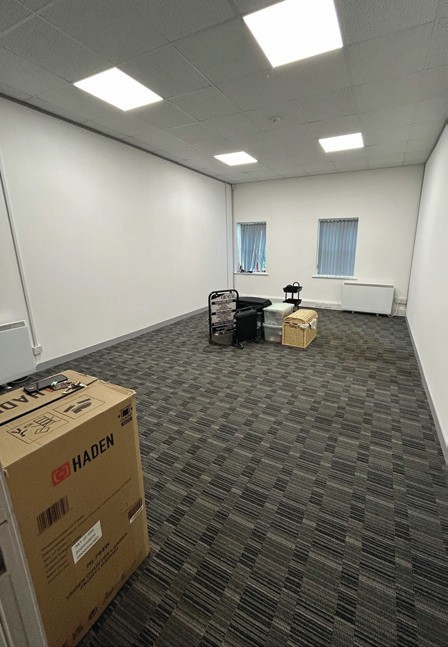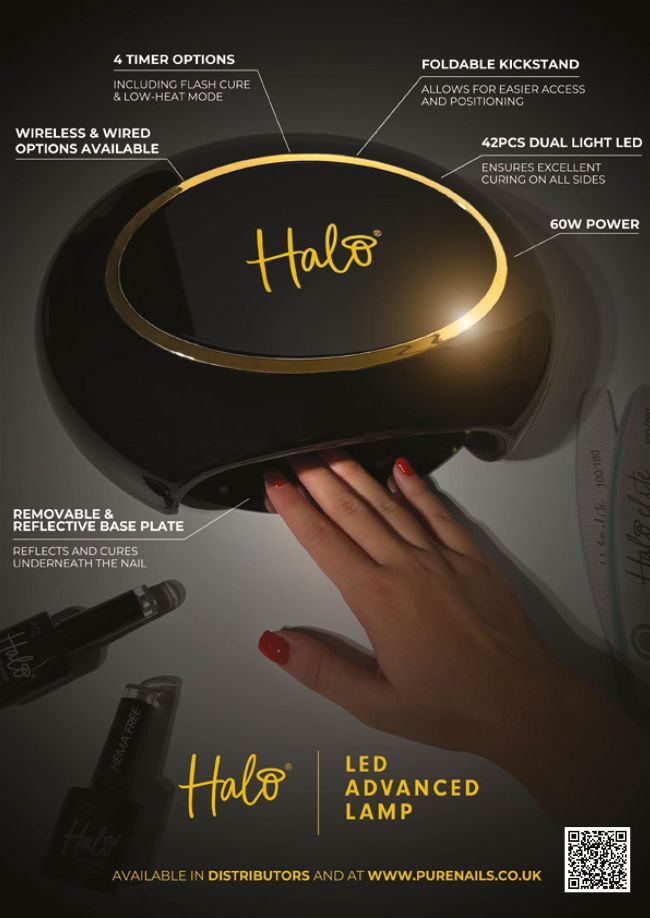TECH TALK
Changing spaces
After facing an abrupt eviction, a Wolverhampton-based nail professional speaks out on the challenges of securing an appropriate salon space
AS TOLD TO ALEX FOX

Holly Harvey
Holly Harvey, a dedicated nail professional, educator & owner of Glo Gal Studio, rented a space for her nail academy in Arlington, Wolverhampton – yet just 30 days after moving into the premises, the landlord demanded that she must leave. Legal action was the method of persuasion, with Holly claiming that her business was not deemed ‘professional’ enough for the business park’s standards.

The former academy space in Arlington.
Holly’s academy was not as the landlord and some tenants expected, as they perceived it to be a nail salon due to odour from products and regular visitors – who were students arriving for classes. Despite taking measures to maintain a professional and considerate environment, including adding air purifiers, dehumidifiers and maintaining ventilation via two large open windows, the landlord stated that her business was unsuitable for the building.

“I wrote a letter explaining what I was doing on the premises as a nail educator & content creator, but with only seven days’ notice of eviction, I did not have the time to fight the decision in court, and it was set to be costly,” Holly shares. “My business and I didn’t fit the image that the building seemed to want, and I was made to feel small, stupid and unprofessional. I wasn’t shown respect or kindness by some of the other tenants, and was issued a legal notice with no discussion. It felt like I was being pushed out and bullied by my landlord, simply for doing what I love, and I had no choice but to leave.”
“Holly’s situation highlights the unique challenges that nail professionals can encounter with landlords who may not fully understand or respect the nature of their work.”
Holly’s situation highlights the unique challenges that nail professionals can encounter with landlords who may not fully understand or respect the nature of their work. Although she is qualified and has been running her business since 2020, Holly was made to feel that her presence ‘brought down the tone’ of the building. Her confidence was knocked, and her sense of legitimacy as a business owner eroded. Following the harrowing event in late summer, Holly has moved to a location where she feels more comfortable. However, she spoke to Scratch in the hope that her experience will serve as a cautionary tale for others in the industry.
Key considerations
Holly’s story serves as a reminder for nail professionals to perform due diligence when choosing a rental space for their business. Clear communication with e landlords and careful consideration of lease terms can help prevent situations like hers, where a misunderstanding about the nature of the business led to abrupt eviction.
Before signing a lease, nail professionals should ensure that the landlord understands the specifics of the business, including:
• Use of the premises.
It’s essential to communicate the intended business type, products used and hours of operation. Some landlords may have limited experience with nail salons or academies, which could lead to misunderstandings.
• Contract specifics.
Many contracts specify acceptable uses for the space, so it’s crucial for nail professionals to clarify and confirm that their business aligns with these terms. Rental agreements may
also include stipulations about repairs and maintenance, which can lead to unexpected expenses if not reviewed carefully.
• Licences and permits.
Local regulations may require specific licences, such as a ‘Special Treatments Licence’ or health & safety inspections. Nail professionals should check with local authorities to ensure compliance and avoid potential conflicts.
• Ventilation and odour control.
Nail products, especially those containing liquid monomers, can have strong odours that may disturb nearby tenants. To avoid complaints, it’s important to use effective ventilation and odour control methods, such as vapour removers and activated charcoal filters.
Respect & recognition
Holly’s story also raises an important conversation about how nail technicians are perceived and treated. As skilled professionals providing valuable services, they deserve the same respect and legitimacy as any other business.
The experience has made Holly determined to advocate for better treatment and recognition for nail professionals. She believes that fostering understanding and respect between landlords and tenants can pave the way for more supportive business environments.
Follow Holly: @glogalstudio @glogalstudio Holly’s updates to clients on social media following the eviction notice.
Pre-rental advice
Industry expert & consultant, Marian Newman BEM, comments:
“As a nail professional seeking to rent a space, be aware that landlords have the right to specify the allowed use of the property, which is often outlined in the lease. Have a thorough and honest discussion with the landlord so they fully understand your intended business operations, including details such as opening hours.
“Rental contracts come in various forms and often require commitment to a specific term. For example, a one-year lease means you’re obligated to pay rent for the full year. Some contracts include a ‘full repairing’ clause, meaning you’re responsible for returning the property to its original condition, covering repairs such as windows, doors or roofing. This can be costly, so try to negotiate terms that require only basic restoration instead.
“Check with the local authority to see if any licences or permissions are needed. Some areas require a ‘Special Treatments Licence’, which may include minimum qualifications and a health & safety inspection. Others may need registration or have specific rules about client parking. If you plan to offer refreshments like coffee, a ‘Food & Beverage Licence’ might also be necessary. Your local authority can provide guidance on these requirements.”
Insurance matters
“Ensure you have the appropriate insurance, covering both public and product liability. Landlords may also require you to insure the property, though sometimes they provide this cover. Consider these insurance costs as part of your overall expenses.
“Lastly, be mindful of your surroundings, especially if you plan to use liquid & powder products. Many people find the odour of liquid monomers unpleasant. Nearby residents or businesses, particularly those dealing with food, may object. Maintaining good ventilation is essential, but open windows and doors may not be enough, as fumes can escape into adjacent spaces.
“The most effective solution is to use vapour removers near the source, such as at your workstation. These should contain at least 1kg of activated charcoal, which needs to be replaced according to the manufacturer’s instructions. Keep all volatile liquids sealed and dispose of paper waste in lidded bins to minimise odours. For small spills, clean with paper towels and place in regular bins. Larger spills may require specialist disposal services.
“When starting or relocating your business, perform due diligence to avoid unforeseen expenses and challenges.”
Ventilation & extraction matters
Nail salons can be hotspots for airborne contaminants, exposing both customers and technicians to harmful chemicals and fine dust particles. Prolonged exposure to these substances can pose health risks, affecting both short-term wellbeing and long-term health.
Nail salons use products that often contain organic compounds like toluene, formaldehyde and ethyl methacrylate (EMA), which are key ingredients in many nail products. These chemicals can be released into the air as vapours or adhere to dust particles, creating invisible hazards in salon spaces. In the short term exposure to these airborne contaminants can cause symptoms such as headaches, dizziness, nausea and irritation of the skin and eyes. However, chronic exposure can lead to more serious conditions.
Advanced extraction technology
To combat the risks associated with poor air quality, advanced fume and dust extraction technologies have been developed specifically for salon environments. Systems like VODEX SalonAIR units are designed to capture and filter out harmful particles from the source, preventing them from circulating in the air that salon staff and clients breathe.
The SalonAIR 1001 and 1002 units combine high-quality filtration with ergonomic, user-friendly designs tailored for salons.
They feature extending arms that capture dust and fumes at the nail desk, eliminating contaminants before they have a chance to spread. The use of HEPA and activated carbon filters helps ensure that even the finest particles and strongest fumes are effectively trapped, contributing to a cleaner and safer salon environment.
Benefits
By removing harmful chemicals and dust particles, extraction systems help to protect the respiratory health of both clients and technicians, reducing the risk of respiratory issues, skin irritations and other health problems associated with salon work. This creates a more comfortable and pleasant experience overall. Good ventilation practices align salons with guidelines from organisations like the Health & Safety Executive (HSE), reinforcing their commitment to responsible business practices.
For more information, visit www.vodex.co.uk
VODEX SalonAIR 1001 £POA www.vodex.co.uk